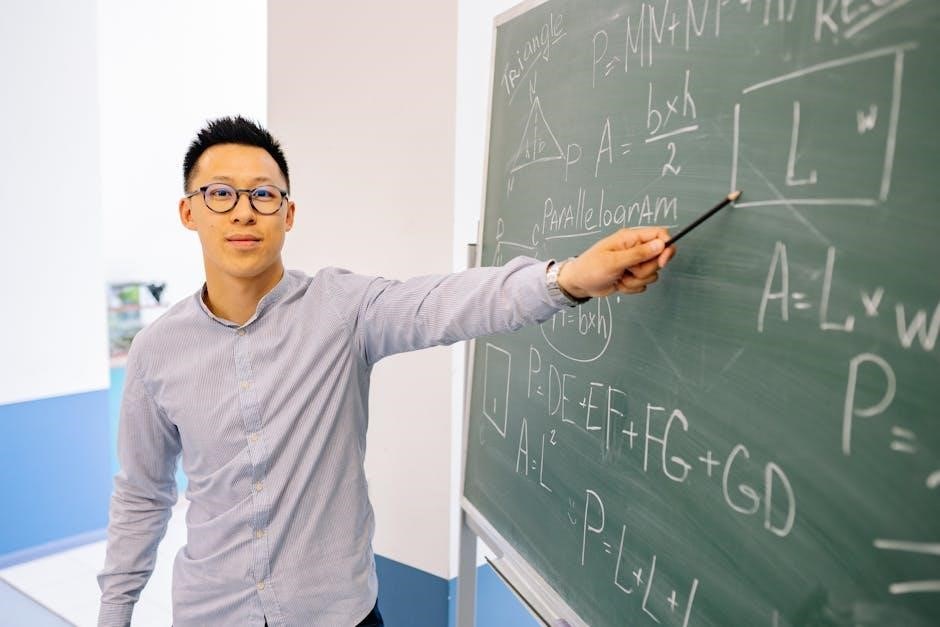Biography and Context of Aristotle
Aristotle was born in 384 BCE in Stagira, Macedonia. His father, Nicomachus, was a physician at the royal court. Aristotle studied under Plato at the Academy in Athens for nearly 20 years, developing a deep understanding of philosophy and science. After Plato’s death, Aristotle traveled extensively, eventually becoming the tutor of Alexander the Great. His works laid the foundation for Western philosophy and science, blending empirical observation with rational inquiry.
1.1 Early Life and Education
Aristotle was born in 384 BCE in Stagira, Macedonia. His father, Nicomachus, a court physician, likely influenced his early interest in science and philosophy. At 17, Aristotle joined Plato’s Academy in Athens, where he studied for nearly 20 years, deeply engaging with Platonic thought. After Plato’s death, Aristotle traveled widely, eventually tutoring Alexander the Great, refining his philosophical and scientific foundations.
1.2 Influence of Plato and the Academy
Aristotle was profoundly influenced by Plato’s theory of Forms, which posits abstract, eternal entities as the ultimate reality. While at the Academy, he engaged deeply with Platonic philosophy, though he later critiqued certain aspects, such as the separation of Forms from the physical world. This intellectual foundation shaped Aristotle’s metaphysics and epistemology, emphasizing reason and universals in knowledge acquisition.
1.3 Aristotle’s Contributions to Philosophy
Aristotle’s contributions revolutionized philosophy, particularly in logic, metaphysics, and epistemology. He established the framework for scientific inquiry, emphasizing observation and reasoning. His theory of knowledge, as outlined in works like Posterior Analytics, introduced concepts like causation and demonstration, laying the groundwork for Western philosophical and scientific traditions. His ideas remain foundational in understanding knowledge acquisition and reality.

Epistemological Foundations
Aristotle grounded knowledge in observable reality, emphasizing experience and reasoning. He rejected skepticism, asserting that knowledge stems from perception and rational demonstration, avoiding radical idealism.
2.1 The Role of Experience and Sensation
Aristotle’s epistemology begins with perception, as sensation initiates knowledge. Through repeated sensations, perception leads to memory and experience, which are fundamental to understanding. Aristotle emphasized that knowledge arises from sensory experiences, forming the basis of rational thought and demonstration.
2.2 The Relationship Between Knowledge and Universals
Aristotle believed knowledge involves universals, which are general concepts derived from particular things. He argued that knowledge of universals is essential for understanding principles and scientific truths. Universals, such as “human” or “tree,” represent shared characteristics, enabling us to classify and comprehend reality. Aristotle saw universals as fundamental to rational understanding and scientific inquiry.
2.3 The Distinction Between Theoretical and Practical Knowledge
Aristotle differentiated between theoretical knowledge (episteme) and practical knowledge (phronesis). Theoretical knowledge seeks universal truths and principles, often for contemplation. Practical knowledge involves applying wisdom to guide actions and decisions, aiming at ethical conduct and the good life. Aristotle valued both, emphasizing their distinct roles in human flourishing and intellectual development.

The Process of Knowledge Acquisition
Aristotle viewed knowledge acquisition as beginning with perception and sensation, progressing to memory through repeated experiences, and culminating in reason and demonstration.
3.1 Perception as the Starting Point
Aristotle viewed perception as the foundation of knowledge, emphasizing that all knowledge begins with sensory experience. Perception, while not knowledge itself, leads to memory through repeated experiences, forming the basis for reason and demonstration. He stressed that perception is essential but insufficient alone for achieving true understanding.
3.2 Memory and Experience
Memory arises from repeated perceptions, enabling the formation of experience. Aristotle posited that memory is crucial for knowledge acquisition, as it allows individuals to recall past sensations and events. Experience, built on memory, provides the raw material for reasoning and demonstration, serving as the bridge between perception and higher forms of understanding and wisdom.
3.3 The Role of Demonstration and Reason
Demonstration and reason are central to Aristotle’s theory, as they enable the transition from particular observations to universal truths. Through syllogistic reasoning, individuals connect specific experiences to broader principles, achieving scientific knowledge. Aristotle emphasizes that true understanding requires grasping the causes and underlying principles of phenomena, making reason the highest faculty in knowledge acquisition.

The Role of Causes in Knowledge
Aristotle viewed causes as essential for understanding reality. He identified four causes—material, formal, efficient, and final—each explaining why something exists or occurs, providing deeper insight into phenomena.
4.1 The Four Causes: Material, Formal, Efficient, and Final
Aristotle’s four causes explain why something exists. The material cause is the substance, the formal cause is its structure or form, the efficient cause is the agent of change, and the final cause is its purpose or goal. These causes provide a comprehensive understanding of an object’s nature and existence, as outlined in his works on metaphysics and physics.
4.2 Understanding Knowledge Through Causation
Aristotle believed that true knowledge requires understanding the “why” behind phenomena. Causation provides the foundation for demonstration and reasoning, linking effects to their underlying causes. By grasping the material, formal, efficient, and final causes, one achieves a profound understanding of reality, as detailed in his Posterior Analytics. This approach emphasizes that knowledge is rooted in causal explanation.
4.3 Criticisms of the Causal Approach
Aristotle’s emphasis on causation has been criticized for its rigidity and potential limitations. Some argue that his framework does not fully account for modern scientific methods or probabilistic knowledge. Critics suggest that relying solely on causation may oversimplify complex phenomena and neglect alternative forms of understanding, such as empirical observation without explicit causal reasoning.

Classification of Knowledge
Aristotle classified knowledge into theoretical, practical, and productive. Theoretical knowledge seeks universal truths, practical knowledge guides ethical actions, and productive knowledge involves creating objects or art.
5.1 Theoretical Knowledge
Aristotle’s theoretical knowledge seeks universal truths and ultimate causes. It is knowledge pursued for its own sake, focusing on contemplation and understanding. This type of knowledge involves demonstrative reasoning, as outlined in his Posterior Analytics, aiming to uncover necessary truths about reality. It is the highest form of knowledge, directed toward intellectual fulfillment and wisdom.
5.2 Practical Knowledge
Aristotle’s practical knowledge pertains to action and ethics, guiding human conduct. It involves phronesis, or practical wisdom, which enables individuals to make virtuous decisions. This knowledge is context-specific, learned through experience and habituation, aiming to achieve eudaimonia, or flourishing. It is distinct from theoretical knowledge, focusing on application in real-world scenarios rather than abstract truths.
5.3 Productive Knowledge
Aristotle’s productive knowledge involves the creation of objects or outcomes through art and craftsmanship. It combines technical skill with rational understanding, aiming to produce something useful or beautiful. This knowledge is practical yet distinct from ethics, focusing on the application of principles to achieve specific ends, making it a bridge between theory and practice in human endeavor.

Criticisms and Legacy
Aristotle’s epistemology faced criticism for its rigidity and lack of empirical grounding in some areas. However, his theories profoundly shaped Western philosophy, influencing centuries of scholarly thought.
6.1 Criticisms of Aristotle’s Epistemology
Aristotle’s epistemology has been criticized for its reliance on causation and its lack of empirical grounding in certain areas. Some argue his approach is too rigid, as it emphasizes universal principles over particular observations. Additionally, his distinction between theoretical and practical knowledge has been challenged for oversimplifying the complexity of human understanding. Despite these critiques, his influence remains profound.
6.2 The Impact of Aristotle’s Theory on Later Philosophy
Aristotle’s epistemology profoundly shaped later philosophy, influencing medieval scholasticism through thinkers like Thomas Aquinas, who integrated Aristotelian concepts with Christian theology. During the Islamic Golden Age, scholars such as Averroes and Avicenna further developed his ideas, ensuring their transmission to Europe. His emphasis on reason and observation also laid the groundwork for the Renaissance and Enlightenment, revitalizing scientific inquiry and philosophical discourse.

Modern Relevance of Aristotle’s Theory
Aristotle’s ideas remain influential in contemporary philosophy, particularly in epistemology, ethics, and science. His emphasis on observation, causation, and rational inquiry continues to inspire modern scientific thought and theoretical frameworks.
7.1 Applications in Contemporary Epistemology
Aristotle’s theory of knowledge, particularly his concepts of causation and demonstration, continues to influence contemporary epistemology. His emphasis on understanding through causes aligns with modern scientific methods, while his distinction between theoretical and practical knowledge resonates in debates about knowledge types. This approach remains relevant in discussions about justification, truth, and the nature of epistemic inquiry today;
7.2 Aristotle’s Influence on Modern Scientific Thought
Aristotle’s methodological approach, emphasizing observation, classification, and causal reasoning, has shaped modern scientific inquiry. His concept of “first principles” and the pursuit of universal truths inspired empirical research. While his specific theories, like the four causes, have been refined, his systematic approach to understanding natural phenomena remains foundational in the development of scientific thought and methodology today.

Key Works and Sources
Aristotle’s “Posterior Analytics” is central to his theory of knowledge, outlining demonstrative reasoning. His “Nicomachean Ethics” and “Metaphysics” further explore knowledge’s ethical and metaphysical dimensions.
8.1 “Posterior Analytics” and Its Significance
In “Posterior Analytics,” Aristotle defines scientific knowledge as a demonstrated conclusion from first principles. He outlines the structure of demonstration, emphasizing syllogism and the necessity of understanding causes. This work establishes Aristotle’s epistemological framework, distinguishing between different types of knowledge and shaping the foundation of scientific inquiry for centuries.
8.2 Other Relevant Works by Aristotle
Besides “Posterior Analytics,” Aristotle’s “Nicomachean Ethics,” “De Anima,” and “Metaphysics” are crucial. “Nicomachean Ethics” explores practical knowledge, while “De Anima” discusses the mind’s role in understanding. “Metaphysics” delves into universal principles, and “Physics” examines natural phenomena, all contributing to his comprehensive theory of knowledge and its acquisition.
Aristotle’s theory of knowledge, emphasizing experience, causation, and classification, remains influential. His ideas bridge theoretical and practical knowledge, shaping philosophy and science for centuries, enduringly relevant today.
9.1 Summary of Aristotle’s Theory of Knowledge
Aristotle’s theory of knowledge emphasizes experience and sensation as the foundation of understanding. He distinguishes between theoretical, practical, and productive knowledge, highlighting the role of causation and demonstration in acquiring knowledge. Aristotle’s framework integrates empirical observation with rational inquiry, providing a comprehensive approach to epistemology that has profoundly influenced Western philosophy and science.
9.2 Reflection on the Enduring Significance of Aristotle’s Epistemology
Aristotle’s epistemology remains influential, offering insights into the nature of knowledge and reality. His emphasis on observation, causation, and logical reasoning laid the groundwork for scientific inquiry. Despite critiques, his theories continue to inspire contemporary thought, bridging ancient and modern philosophical traditions with timeless relevance and intellectual depth.

Leave a Reply
You must be logged in to post a comment.